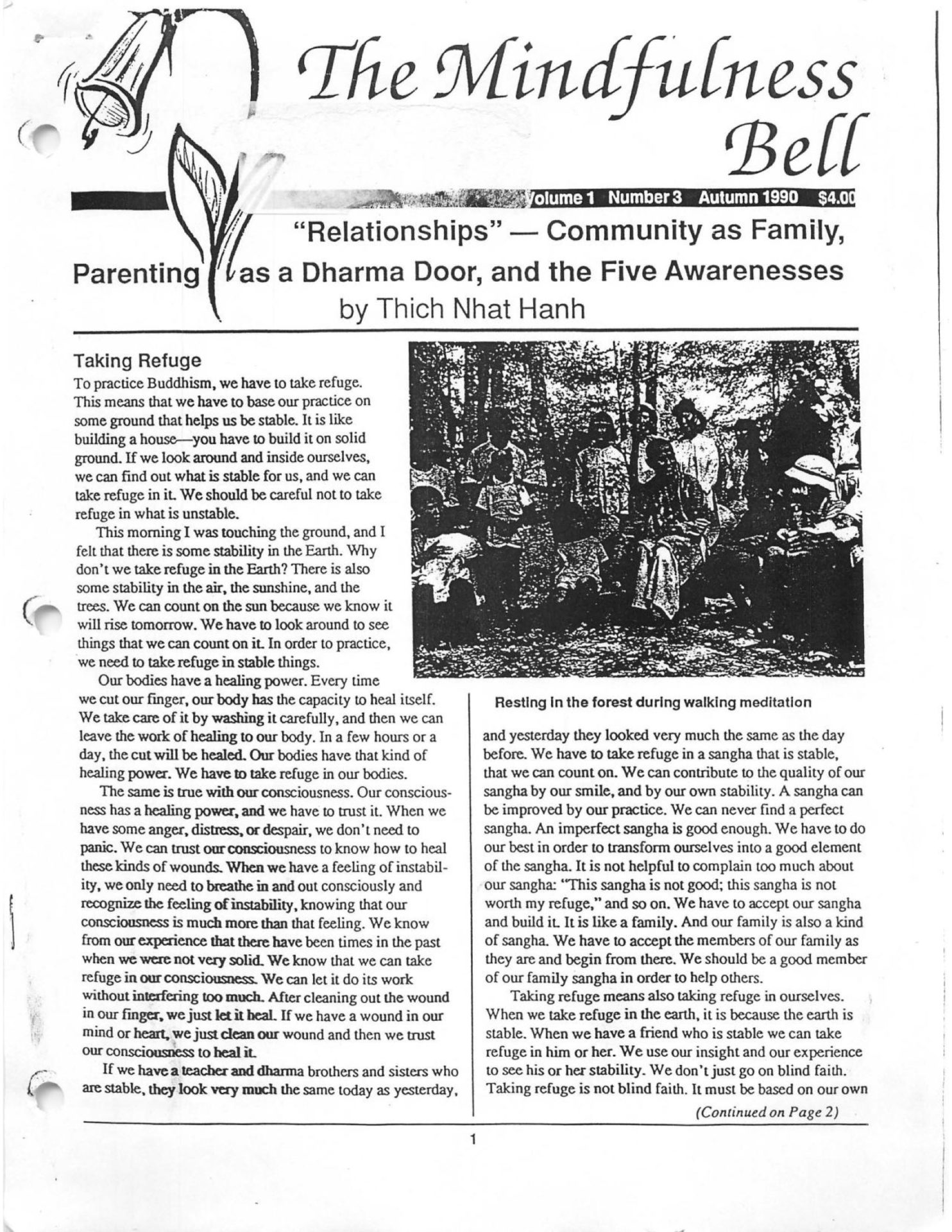This morning a friend called and said that she had a question for Thich Nhat Hanh, but that until she could ask him directly, she wanted to know what I thought. She said, “It is a question about forgiveness.” I immediately knew that her question was also my question — “How do I regard my abuser?” My friend spoke of Thay’s poem, “Call me by my True Names,” about the girl who is raped by the sea pirate.
This morning a friend called and said that she had a question for Thich Nhat Hanh, but that until she could ask him directly, she wanted to know what I thought. She said, "It is a question about forgiveness." I immediately knew that her question was also my question -- "How do I regard my abuser?" My friend spoke of Thay's poem, "Call me by my True Names," about the girl who is raped by the sea pirate. She talked of her experience and then said that she could not forgive her father. I was in a similar conversation a short time ago. I was visiting a very close friend of mine, whom I had not seen since my return from the Satipatthana retreat at Plum Village. I told her how I was rethinking our feminist exhortation to "know your enemy." As I talked, I could feel her becoming increasingly uncomfortable. Having just reached the point, at forty-eight, of being able to remember her sexual abuse by her father, and being able to own her anger towards him, she was disturbed by what I was saying. Did I mean that she should forgive her father? She said she had to hold him responsible for his actions. In that moment of her sincere and piercing questions, I felt suddenly unsure of everything. I knew only that this woman standing before me, had been intolerably lonely, depressed, and suicidal; that slowly this was beginning to change for her; that she now had hope that she could live fully, with joy and happiness.
In that moment, I felt like the well-known bull in a china shop, and I knew what damage could be wrought so quickly by the arrogance of the dogmatic. Was I turning this beautiful practice of compassion into a concept? I thought of the second precept of the Order of Interbeing: "Truth is found in life and not merely in conceptual knowledge."
I am grateful to my friend for staying with me, for working though our feelings and for bringing me back to the truth of my own life. For many years I cultivated a "blaming practice" in which I developed a hatred for the men at whose feet, or in whose hands, I laid the responsibility for raping women and destroying the planet. Then I found myself in a loving kindness meditation at the end of a ten-day retreat, and something in me let go. I wept, and slowly I opened my fist and extended my hand to the world. This last gesture has taken me seven years.
Coming back to the question my friend posed this morning, I find that I am without answers and have only fragments toward an answer:
- For me the "blaming practice" cast an armor around my heart that hardened into a stranglehold. It was and is a profound relief to let it go. For others, like my friend, anger comes as a gift to herself in her own healing process.
- Over and over again, Thay reminds us that we "have to deal with our anger with care, with love, with tenderness, with nonviolence."
- Perhaps those of us who are not so immediately involved in the moment of anger may be able to hold compassion, understanding, and consciousness of interbeing in our hearts. I can hold the understanding that Barbara's father grew up poor and neglected; that he became an alcoholic as a young man; that he repeated family patterns that Barbara herself has traced back through many generations. I can see that "this is, because that is," and that we are all part of the web that makes incest possible.
- I must avoid calling anger a phase and forgiveness the goal. Treating a woman's anger as something to be worked through so that she can come to the higher, more enlightened position of forgiveness is hurtful and arrogant. It is an attitude that barely disguises exactly the kind of conceptual separation that Thay is warning us about -- separation between my friend and her anger. If I am to treat her lovingly, must I not treat her anger lovingly? If I tell her that her anger is wrong, or talk in that conceptual way so that she thinks that that is what I am saying, I am promoting yet another belief which turns a woman against herself, and that is precisely what I do not want to do.
I write this piece in the hopes that there are others willing to share their experience and understanding of these questions.
Anne DeUenbaugh Brunswick, Maine

